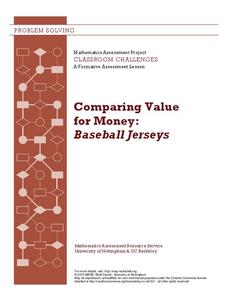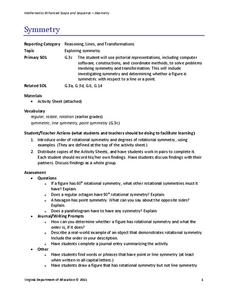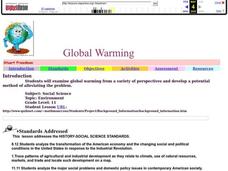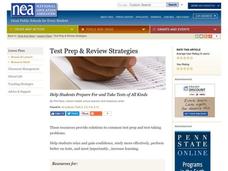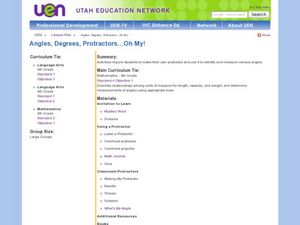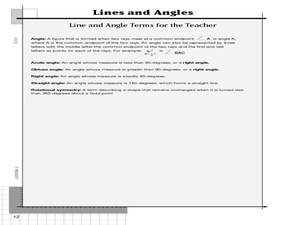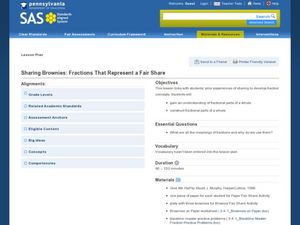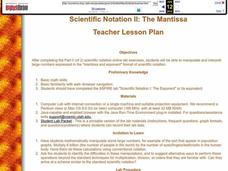Illustrative Mathematics
Molly's Run
A simple lesson with a lot of support behind it. Your learners will find out how long it takes Molly to run a mile by choosing their solution method. The activity can be used as a lesson or as an independent assignment. Preface with...
Illustrative Mathematics
Adding Multiples
Mathematicians practice communicating why the sum of two multiples of a number results in another multiple of that number. Encourage learners to construct a viable argument by applying the distributive property or by drawing a diagram....
Illustrative Mathematics
Doubling Numerators and Denominators
Understanding the meaning of fractions is a challenge for many young learners. These two questions examine what happens when the numerator and denominator of a fraction are doubled. Consider allowing young scholars to discuss their...
Curated OER
Cell Phones
Your texters will enjoy assessing their knowledge of function notation in this simple set of exercises. They will also interpret function notation in terms of the given context.
Curated OER
Linear or Exponential?
Your learners analyze various real-life contexts to decide if each is a linear or exponential model. This could be used as an assessment of learners' skills of discerning between a linear and an exponential model.
Curated OER
Comparing Value for Money: Baseball Jerseys
Learners step up to the plate as they first complete an assessment task using linear equations to determine the best company from which to buy baseball jerseys. They then evaluate provided sample responses identifying strengths and...
Mathematics Assessment Project
Building and Solving Linear Equations
Young scholars write and solve linear equations in one variable based on descriptions of the operations that are applied to the unknown variable in an algebra machine. They then create their own problems for classmates to solve.
Mathematics Assessment Project
Classifying Equations of Parallel and Perpendicular Lines
Parallel parking might be difficult, but finding parallel lines is fairly simple. In this lesson plan, learners first complete an assessment task involving parallel and perpendicular lines in the coordinate plane. Individuals then take...
02 x 02 Worksheets
Symmetry
Get learners' minds rotating and reflecting while looking for symmetry. Pupils investigate figures to determine the number of lines of symmetry and if the figure has rotational symmetry. Classmates work together in groups to find out the...
Curated OER
Global Warming
A series of independent learning activities teaches learners about global warming as it relates to economics and industrialization. The culminating project requires them to create a multimedia presentation identifying the problems,...
EngageNY
Normal Distributions (part 2)
From z-scores to probability. Learners put together the concepts from the previous lessons to determine the probability of a given range of outcomes. They make predictions and interpret them in the context of the problem.
Curated OER
Angles All Around Us
Explore with your class the characteristics of acute, obtuse, right, complementary, and supplementary angles. They take digital photographs around the school and identify the angles in the images. Uisng software, they label and...
Education World
Investigating Volume
Explore the concept of volume using unit cubes. Working individually or in small groups, your class measures with a ruler in inches and calculates the volume of various rectangular household boxes (provided by the teacher) and completes...
Curated OER
Play Ball: A Major League Review Game
In this review and test-taking practice lesson plan, the classroom is set up like a baseball field. The class is set up into 2 teams and has to answer questions that moves them along the bases like in baseball. The team that wins has the...
Curated OER
Yummy Gummy Subtraction
Students practice subtraction facts using gummy bears. In this subtraction lesson, students use the gummy bears as a manipulative to solve simple subtraction facts.
Utah Education Network (UEN)
Angles, Degrees, Protractors . . . Oh My!
Fourth and fifth graders make a protractor and identify various angle types. In this protractor and angle lesson, learners make their own protractor and use it to measure a variety of angles. They complete worksheets while identifying...
Curated OER
A Weigh we Go!
Here are some cross-curricular activities whil should help your kids understnad weight measurements and grammar. In this grammar and math lesson, learners read the book Skittles Riddles and practice counting and balancing skittles. They...
Curated OER
Lines and Angles with K'NEX
Here is a geometry instructional activitywhich invites learners to create models using their knowledge of lines, segments, rays, and angles. This instructional activity reinforces geometric vocabulary and concepts through practical...
Curated OER
Hybrid Vehicles: Cut Pollution and Save Money
Math and science meet in this lesson on hybrid electric automobiles. This 24-page resource provides everything you need for teaching a lesson that compares the use of internal combustion engines to hybrid electric engines. Participants...
Shodor Education Foundation
An Introduction To Quadrilaterals
Young geometers investigate and apply properties of quadrilaterals. After a review and discussion of key terms, young scholars use a computer applet to explore four-sided figures and classify them according to their attributes. The...
Curated OER
Sharing Brownies: Fractions That Represent a Fair Share
Elementary graders discover the concept of fractional pieces of a whole. They investigate the meanings of fractions in everyday life and why they are used. Pupils divide brownies amongst each other to demonstrate the use of fractions...
Illustrative Mathematics
How Thick Is a Soda Can II?
Science, technology, and math come together in this one combination exercise. Analyzing the common soda can from both a purely mathematical perspective and a scientific angle allows for a surprisingly sophisticated comparison of...
Project Maths
Correlation Coefficient
Of course, there might be a correlation! Young mathematicians investigate several different data sets, create scatter plots, and determine any correlation. They consider whether a causation exists between any of the variables in question.
Curated OER
Scientific Notation II: The Mantissa
Practice converting a conventional number into scientific notation, and vice-versa. Using an applet, they perform the operations of multiplication and division on numbers expressed in scientific notation.





